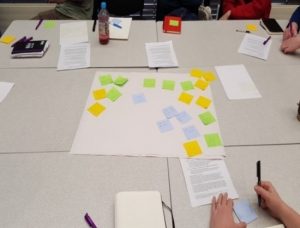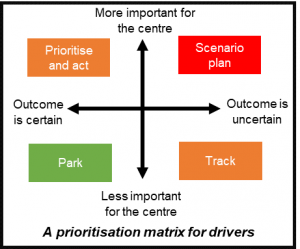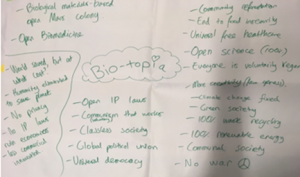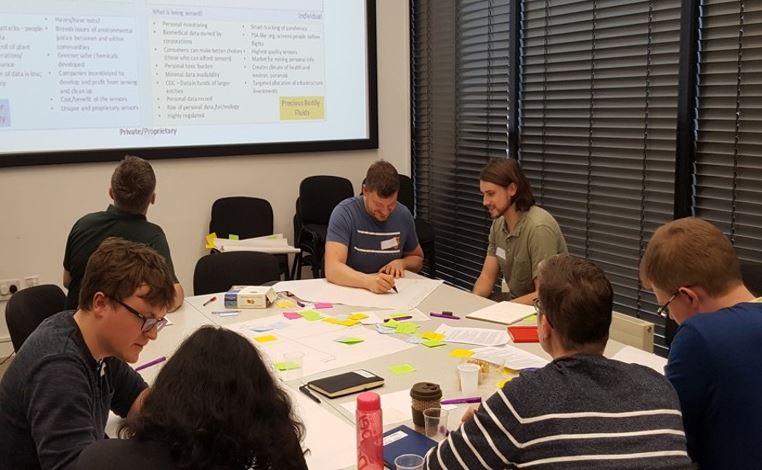RRI Group Research Brief 20/04 | April 2020
Scenario building toward responsible innovation
Insights from a workshop for early career researchers in biomanufacturing and synthetic biology
Chris Mellingwood, Nicholas Matthews and Andrew Watkins
 In February 2020, researchers from the Responsible Research and Innovation (RRI) Group at the University of Manchester hosted a workshop with eight research fellows from the Future Biomanufacturing Research Hub (FBRH). This workshop, which built on an earlier session (RRI Research Brief 20/03), explored ways that frontline early-career researchers could embed RRI into their work.
In February 2020, researchers from the Responsible Research and Innovation (RRI) Group at the University of Manchester hosted a workshop with eight research fellows from the Future Biomanufacturing Research Hub (FBRH). This workshop, which built on an earlier session (RRI Research Brief 20/03), explored ways that frontline early-career researchers could embed RRI into their work.
During the two-hour workshop the three RRI-group researchers worked collaboratively with the FBRH fellows in an exercise to map out future scenarios regarding applications derived from FBRH research. This brief highlights the methodology, experiences and insights from the exercise.
Step 1: Mapping the key drivers
Inspired by previous scenario-based RRI work, the exercise first involved identifying major trends and drivers influencing the centre and the application of research outcomes spanning political, economic, societal, technological, legislative and environmental (PESTLE) concerns.
These drivers were then mapped onto a prioritisation matrix (see above). Drivers judged to be both highly important and uncertain where then used to make a scenario matrix based on two critical “axes of uncertainty”. The group chose axis one to be proprietary vs open approaches to research, and axis two as synthetic biology turning out to be either beneficial or harmful.

Step 2: Developing scenarios.
The next step was to develop narrative descriptions of four scenarios at the extremes of the two axes, intended to form thought provoking caricatures. For the drivers selected this related primarily to the future of the broader bio-economy.
In groups of two (with the RRI-group researchers circulating), workshop participants came up with the following highly creative scenarios:
- ‘Bio-utopia’ where the promise of synthetic biology is realised through open access, bringing about tremendous global benefits;
- ‘Strangelove’ where open access leads to the misuse of scientific research and subsequent public distrust and de-funding of science;
- A commercially driven bio-economy emerges, but one that limits competition, curtails innovation and increases global inequality; and
- A future where sensitive and potentially harmful research goes hidden from public scrutiny.

Each of the four scenarios was presented back to the group, followed up with an open discussion on RRI and its take-up by early-career researchers.
Summary and reflections. The workshop allowed researchers to engage with RRI through a scenario building exercise involving research anticipation and participant reflexivity. Initially, some participants indicated scepticism about RRI as a concept. However, feedback indicated that the scenario building exercise was generally helpful in illustrating its use and in allowing participants to project and discuss potential future implications of their research, even if the discussion tended towards high level concerns. In the future scenarios could be developed which are focussed more on the work of the FBRH.
These RRI session and workshop activities are experimental. We hope that they open up opportunities for additional engagement. In particular, further activities could explore how to connect lab work and targets with addressing societal needs and equipping synthetic biology researchers with the capacity to implement and sustain their own RRI activities into the future.
Chris Mellingwood and Andrew Watkins are Postdoctoral Research Associates with the Manchester Institute of Innovation Research (MIOIR). Nicholas Matthews is a doctoral researcher in the PhD programme in Science, Technology and Innovation Policy at MIOIR.
The Responsible Research and Innovation (RRI) Group at the Manchester Synthetic Biology Research Centre (UKRI Biotechnology and Biological Sciences Research Council Award BB/M017702/1) undertakes research and analysis and facilitates collaboration and deliberation to anticipate, prepare for, or mediate impacts of synthetic biology technologies in society, economy, and the environment. The Future Biomanufacturing Research Hub (FBRH) at the University of Manchester (UKRI Engineering and Physical Sciences Research Council, Award EP/S01778X/1) is developing innovative technologies for high-value manufacturing to sustainably produce pharmaceuticals, chemicals and materials.
The Responsible Research and Innovation workshop was held on 27 February 2020 at FBRH at the University of Manchester. For further details, contact: andrew.watkins@manchester.ac.uk

